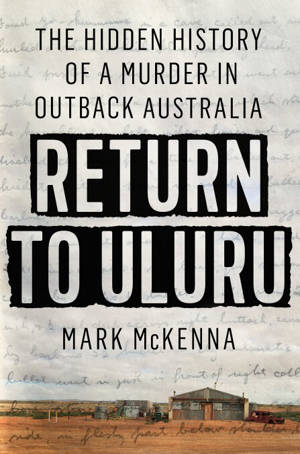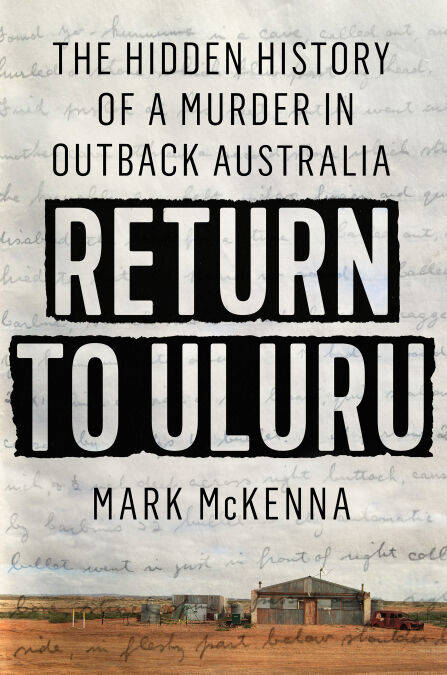
Je cadeautjes zeker op tijd in huis hebben voor de feestdagen? Kom langs in onze winkels en vind het perfecte geschenk!
- Afhalen na 1 uur in een winkel met voorraad
- Gratis thuislevering in België vanaf € 30
- Ruim aanbod met 7 miljoen producten
Je cadeautjes zeker op tijd in huis hebben voor de feestdagen? Kom langs in onze winkels en vind het perfecte geschenk!
- Afhalen na 1 uur in een winkel met voorraad
- Gratis thuislevering in België vanaf € 30
- Ruim aanbod met 7 miljoen producten
Zoeken
Return to Uluru E-BOOK
The Hidden History of a Murder in Outback Australia
Mark McKenna
E-book | Engels
€ 13,88
+ 13 punten
Uitvoering
Omschrijving
"THIS WEEK'S HOTTEST NEW RELEASES: Murder befouls the outback... [A] gripping work of true crime." —USA TODAY
Return to Uluru explores a cold case that strikes at the heart of white supremacy—the death of an Aboriginal man in 1934; the iconic life of a white, "outback" police officer; and the continent's most sacred and mysterious landmark.
Inside Cardboard Box 39 at the South Australian Museum’s storage facility lies the forgotten skull of an Aboriginal man who died eighty-five years before. His misspelled name is etched on the crown, but the many bones in boxes around him remain unidentified. Who was Yokununna, and how did he die? His story reveals the layered, exploitative white Australian mindset that has long rendered Aboriginal reality all but invisible.
When policeman Bill McKinnon’s Aboriginal prisoners escape in 1934, he’s determined to get them back. Tracking them across the so called "dead heart" of the country, he finds the men at Uluru, a sacred rock formation. What exactly happened there remained a mystery, even after a Commonwealth inquiry. But Mark McKenna’s research uncovers new evidence, getting closer to the truth, revealing glimpses of indigenous life, and demonstrating the importance of this case today. Using McKinnon’s private journal entries, McKenna paints a picture of the police officer's life to better understand how white Australians treat the center of the country and its inhabitants.
Return to Uluru dives deeply into one cold case. But it also provides a searing indictment of the historical white supremacy still present in Australia—and has fascinating, illuminating parallels to the growing racial justice movements in the United States.
Return to Uluru explores a cold case that strikes at the heart of white supremacy—the death of an Aboriginal man in 1934; the iconic life of a white, "outback" police officer; and the continent's most sacred and mysterious landmark.
Inside Cardboard Box 39 at the South Australian Museum’s storage facility lies the forgotten skull of an Aboriginal man who died eighty-five years before. His misspelled name is etched on the crown, but the many bones in boxes around him remain unidentified. Who was Yokununna, and how did he die? His story reveals the layered, exploitative white Australian mindset that has long rendered Aboriginal reality all but invisible.
When policeman Bill McKinnon’s Aboriginal prisoners escape in 1934, he’s determined to get them back. Tracking them across the so called "dead heart" of the country, he finds the men at Uluru, a sacred rock formation. What exactly happened there remained a mystery, even after a Commonwealth inquiry. But Mark McKenna’s research uncovers new evidence, getting closer to the truth, revealing glimpses of indigenous life, and demonstrating the importance of this case today. Using McKinnon’s private journal entries, McKenna paints a picture of the police officer's life to better understand how white Australians treat the center of the country and its inhabitants.
Return to Uluru dives deeply into one cold case. But it also provides a searing indictment of the historical white supremacy still present in Australia—and has fascinating, illuminating parallels to the growing racial justice movements in the United States.
Specificaties
Betrokkenen
- Auteur(s):
- Uitgeverij:
Inhoud
- Aantal bladzijden:
- 256
- Taal:
- Engels
Eigenschappen
- Productcode (EAN):
- 9780593185780
- Verschijningsdatum:
- 8/08/2022
- Uitvoering:
- E-book
- Beveiligd met:
- Adobe DRM
- Formaat:
- ePub

Alleen bij Standaard Boekhandel
+ 13 punten op je klantenkaart van Standaard Boekhandel
Beoordelingen
We publiceren alleen reviews die voldoen aan de voorwaarden voor reviews. Bekijk onze voorwaarden voor reviews.









